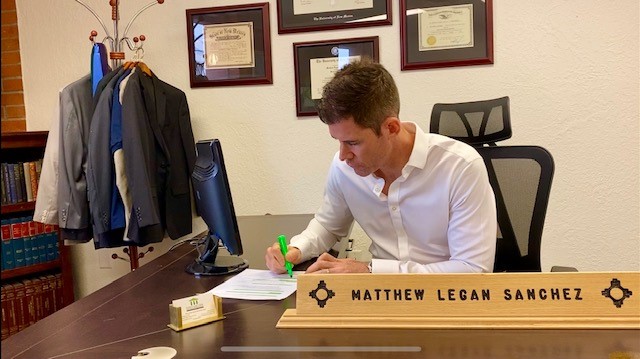
New Mexico Child Custody and Parental Visitation Schedules
CHILD CUSTODY AND PARENTAL TIME SHARING SCHEDULES IN ALBUQUERQUE, NEW MEXICO
Child Custody and parental timesharing schedules in Albuquerque, New Mexico are Two Towers of family law that cast a shadow on virtually every other issue in family court. Today we will journey down the winding roads that lead to a court ordered child custody and parental visitation schedule.
The first road involves children born out of marriage. When children are born outside of marriage, there are two paths that one’s case generally follows.
The first path involves father’s that have already developed a relationship with the child. In this scenario, at times, the parents agree on an amicable time-sharing arrangement without the court’s influence. The time-sharing that the parties follow after the separation is crucial for bonding, and also for establishing a “status quo” that will heavily influence the court’s decision regarding time-sharing, in the event that the amicable relationship falls apart with the case eventually splashing into court.
The second path for children born outside of marriage involves situations where the Father has not established a relationship with the child, and consequently the child has not bonded with the absent parent. The lack of relationship and bonding can be caused by a number of different reasons, such as: (1) Newborn child, (2) Newly discovered parentage, (3) Prison, military, or some other cause preventing the father from establishing a relationship.
When the parent and child have not developed a relationship, and both parents are unable to reach an amicable agreement regarding child custody and parental time-sharing, the court is tasked with determining the appropriate system of time-sharing. Particularly in Albuquerque, the court’s initial time-sharing decision is heavily influenced by the Suggested parental Time-sharing Guidelines that were developed by child psychologists.
Click here to review the Suggest Time-sharing Guidelines: Suggested Visitation and Time-sharing Guidelines.
As the Suggested Guidelines demonstrate, New Mexico courts generally prefer the initial time-sharing to begin with one primary home. In the court’s view, having a primary home and custodial parent enables the child to develop essential bonding and appropriate attachment to the custodial parent. At the beginning stages, the guidelines suggest short, predictable, and frequent visitation with the non-custodial parent to ensure appropriate bonding. As the child ages, the guidelines provide increased time-sharing with the non-custodial parent, eventually moving into a 50-50 relationship.
For practical purposes, and for real world illustration, let me outline the sliding scale of time-sharing schedules Albuquerque, New Mexico courts generally use with parental time-sharing disputes. These time-sharing schedules are in line with the suggested guidelines, and demonstrate how parental time–sharing expands with a child’s age and developmental progress.
Supervised Parental Visitation Child Custody Schedule
1-2 hours for 1-2 times per week. Supervised parental visitations either take place at an agency (such as APN or Neutral Corner) or the home of an immediate family member.
Supervised visitation is generally ordered in cases with infants that have not developed a relationship with one parent. This form of visitation may also be considered with other bonding issues, such as long periods of absence, emotional abuse, or mental health issues. Lastly, supervised visitation can also be ordered in cases with substance abuse issues, domestic abuse, or other issues threatening the child’s safety/welfare.
2-4 hour visits, up to four times per week
This increased parental time-sharing schedule affords predictable and frequent time-sharing. With this system the court prefers one primary home for bonding and attachment to the custodial parent, to facilitate the child’s developmental progress with primary and secondary bonding.
One Full day visit
6-8 hours.
This time-sharing schedule provides the non-custodial parent with a full day of time-sharing. This system allows the secondary parent and child to enjoy malls, parks, and other events during the day.
Initial overnight. Every other Friday/Sat after school to Saturday/Sunday afternoon
Time-sharing progresses into overnights, every-other weekend.
Every Week 1-2 days
Consecutive overnights each week.
5-2 Split Custody Schedule
Every-other weekend, such as Friday after school/PM to Monday drop off at school/AM.
Dinner visit on off week (i.e. Wednesday from 5-8 PM).
2-2-3 Split Custody Schedule
Friday PM to Monday AM;
Monday after school/PM to Wednesday drop off at school/AM;
Wednesday afternoon to Friday AM drop off.
4-3 Split Custody Schedule
Monday to Friday.
Friday to Monday.
This system of time-sharing is generally disfavored because the schedule has the potential for different exchange days each week. As such, this system creates inconsistency with the child’s schedule.
50-50 Custody Schedule in New Mexico
The parental time-sharing schedules outline above are generally what one should expect to receive, after placing the ultimate decision of time-sharing into a New Mexico Judge’s hands.
The Second road involves children born during marriage. On this road, a crucial starting point is the date of separation. Similar to children born outside of marriage, in the marriage context, the time-sharing that takes place from the date of separation becomes the “status quo.” This status quo, in turn, influences the court’s decision regarding the appropriate time-sharing after the divorce.
The time-sharing schedules outlined above also apply to children born during a marriage. Parents that are unable to agree on the necessary Parenting Plan, and time-sharing schedule contained therein, can expect the court to Order one of the time-sharing schedules above.
On both roads – children born outside of marriage and during marriage – New Mexico courts that are tasked with determining initial time-sharing prefer slow and gradual increases. Notwithstanding this fact, New Mexico courts are also extremely reluctant to disrupt a child’s routine (i.e. status quo time-sharing) based on the plethora of adverse developmental repercussions that such a disruption can trigger.
Possibly the person reading these words is now standing at a cross roads with parental time-sharing. Potentially you just discovered that you are going to be a parent and want to be as heavily involved with your child as possible. Alternatively, it is possible that you have a child and are now separating from the child’s co-parent. Another alternative is that you are married with children and are contemplating a divorce or separation.
No matter what road that you are traveling, a key take away from today’s discussion is that New Mexico court’s tasked with developing an initial time-sharing plan generally begin with short, frequent, and predictable time-sharing. Albuquerque courts in particular tend to follow the time-sharing guidelines attached above. This parental time-sharing is gradually expanded, allowing time for the non-custodial child and parent to develop an indelible bond in order to prevent potential attachment disorders, and other developmental issues.
Based on the court’s preference for slow progress, it is imperative for parents that desire maximum time-sharing to become instantly involved with the child’s development. If you are still living with the other parent, but anticipate a separation/divorce, immediately get involved with the following activities:
- General care of the child;
- Potty training;
- Teaching numbers, letters, colors;
- Taking time off work for appointments;
- Taking the child to appointments and necessities;
- Attending school functions;
- Helping child with homework;
- Involvement with sports, music, dance and other extracurricular; and
- Involvement with family friends, and activities.
As you have read, it is imperative to seek maximum time from the date of birth, or separation – thereby establishing a “status quo” and bonding that can bypass the beginning stages of slow and incremental time-sharing that New Mexico courts tend to prefer.
(505) SANCHEZ IS HERE TO ANY QUESTION ABOUT CHILD CUSTODY AND PARENTAL TIMESHARING SCHEDULES IN ALBUQUERQUE, NEW MEXICO
Do you still have questions about the potential child custody and parental timesharing schedules in Albuquerque, New Mexico? Custody and parental timesharing schedules in Albuquerque often require the experienced hand and knowledge that comes with years of courtroom practice. Matthew Legan Sanchez has the experience needed to handle your unique case. Sanchez can be reached by calling (505) SANCHEZ.

Custody and timesharing schedules in Albuquerque, New Mexico.






